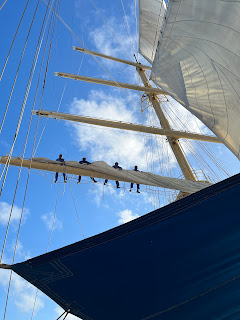This was something we learned very early on - the Royal Clipper is a ship, and never to be called a boat. In conversations over the 16 days we sailed, every time someone slipped up and called it a boat, there was a chorus of voices saying "ship!" Even after we landed, for days we would say "ship" when either of us said the b word.
We had good luck with the weather, following a high pressure system most of the way which meant sunshine and not one bit of rain. The down side of this was there was very little wind for sailing. Added to this was the fact that we were going southwest to northeast, against the trade winds.
So most of the time, to the frustration of the captain and the passengers, we had to motor. Well, we have decided that is another reason to do the same sailing voyage in reverse someday, when we have been assured that the ship sails the entire way.
We stopped only once, for a full day in Ponta Dalgada, where it did rain. There we visited the blue and green lakes, a wonderful botanical garden, a small family run pineapple farm, and small villages, then had a seafood feast with local cheese (apparently most of the milk sold in Portugal, as well as the pineapples, come from the Azores)
After we departed the island of San Miguel, we turned more east than north, and so got some good sailing in at last.
Most of the Royal Clipper's sails open and close using hydraulics, but the lowest sails have to be opened and then reefed in by hand, so at the end of the day we'd see a group of crew precariously stretched across the mast's arms, balanced on only a single rope, and working in tandem to pull up and tie the huge heavy sails. We can't imagine what it would be like if the sails were wet and thus even heavier!
We have fond memories of our favourite spots on the ship - no not just the dining room (even though we spent 3 meals a day there!). Martin loved being in the bow net, looking for dolphins and turtles. this is surprising as he has no head for heights and here he was lying high above the sea in a net 30 feet forward of the ship.
 |
| view of the ship from the bow net |
 |
| Martin and friends hanging out |
Jenny liked the little seats, one on either side of the bow, even though it was so windy.
 |
| where is she? |
 |
| there she is, in a tiny seat over the waves |
Standing at the stern was calm and beautiful with the sun sparkling in flecks from the quiet wake, but there were a group of people who hogged the seats there morning and night so it was difficult to have a quiet moment. Especially when we saw one elderly man cutting his toenails right there on the deck!
Martin spent a lot of time in the library playing bridge or working on puzzles, while Jenny favoured reading up on the top deck. When the waves were quite big, the deck chair would suddenly shift forward or backward to the opposite side, with her in it, so then she preferred reading in the cabin.
The nights were spectacular with stars, as the ship used very little light and it was easy to move away form them. And the days were just wall to wall ocean. We saw very few ships or sea life until we came closer to Africa's coastline when whales, dolphins, turtles and birds occasionally were seen. A few small birds landed on our deck, blown off course, dehydrated and exhausted. The crew tried to keep them safe until we got closer to shore, but they sadly rarely made it.
Our favourite day was when we saw a little flotilla or what looked like water bottles but turned out to be Caravelas, a cousin to the Velella Vellela jellyfish we see on the Pacific sometimes. Also know as "By-The-Wind-Sailors" (a wonderful name) the Pacific ones seem to be more evolved, as their jelly-like protrusion can act like a sail, or, when they flip over, a rudder to help them move, whereas these Atlantic cousins can't flip over, so don't actually move themselves at all and are at the mercy of the the currents and the wind to direct their course across the sea. They got their name because they resemble the traditional Portuguese caravel sailing and warships, which is why the large ones are called Portuguese man-of-war. These ones have a long tendril that can sting like stink anything it touches. Don't let it be you!
So as we sail into the sunset, or rather the sunrise as we are heading east to Lisbon, we say not goodbye to our ship, but au revoir.
Life on mere boats will just not be the same.


No comments:
Post a Comment